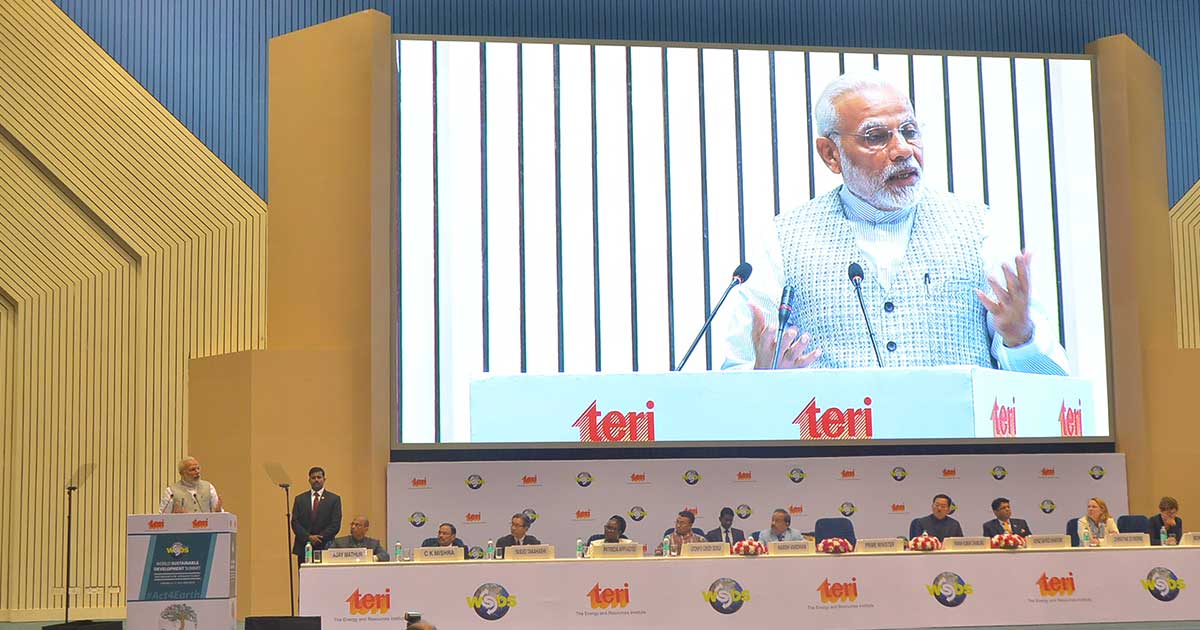
Prime Minister Narendra Modi Inaugurates TERI’s World Sustainable Development Summit Reaffirms India’s commitment to sustainable growth

Invoking the ancient Vedic scripture, the Atharva Veda, Prime Minister Narendra Modi today said that natural resources belong to the nature and we are mere trustees or managers of this wealth. The Prime Minister, while speaking at the inauguration of the World Sustainable Development Summit 2018, in New Delhi, said “We are here today to act upon the belief that we as humans can make a difference to this planet. We need to understand that this planet, our Mother Earth, is one. And so, we should rise above our trivial differences of race, religion, and power, and act as one to save her.”
The Prime Minister called the WSDS a reinforcement of India’s commitment to a sustainable planet for current and future generations. He said that over the years, the World Sustainable Development Summit has spread consciousness about India’s actions to preserve the purity of Mother Earth to all parts of the world. He highlighted that India believes in growth but remains committed to protecting the environment. In line with this thought, India, along with France, initiated the International Solar Alliance which already has 121 members.
"It is perhaps, the single most important global achievement after Paris (Agreement)," The Prime Minister said.
The Prime Minister said that not only is India on track to achieve its pledge of reducing the emission intensity of its GDP by 20–25% from 2005 levels by 2020 but is also on track to meet the 2030 Nationally Determined Contributions. Focussing on some of the key initiatives of the Government, including Make in India, the Ujjwala and Saubhagya initiatives as well as the recently launched national health scheme, the Prime Minister said, “People in India have waited too long for access to modern amenities and means of development. We have committed to complete this task sooner than anticipated. However, we have also said that we will do all this in a cleaner and greener way.”
The Prime Minister also called for greater international cooperation, saying “successful climate action needs access to financial resources and technology. Technology can help countries like India develop sustainably and enable the poor to benefit from it.”
Addressing the inaugural gathering, Dr Harsh Vardhan, Minister for Environment, Forest and Climate Change, termed climate change as one of the biggest threats to civilization. He said that India is conscious of the fact that some of the effects of climate change were irreversible and therefore, the country is investing in adaptation actions in vulnerable sectors through a dedicated National Adaptation Fund.
Dr Harsh Vardhan reiterated the Government’s commitment to making environmental protection into a citizen’s movement. “Every individual can contribute by executing at least one green, good deed every day through the green social responsibility. The smallest step heralds the biggest changes,” he said.
Delivering the welcome address, Mr Ashok Chawla, Chairman, The Energy and Resources Institute (TERI) said that WSDS 2018 brought together the finest minds from all walks of life to collaborate efforts against climate change. He pointed out that historic changes are taking place in India. There is rapid urbanization leading to large-scale migration towards cities, he said. There is also a strong need to ensure electricity access for the underserved while fulfilling the demand for habitat, food, and water. Mr Chawla added that the poor will be the most affected by the impacts of climate change. He emphasized the need to define progress and visualize it in terms of sustainability.
Dr Ajay Mathur, Director General, TERI, who delivered the vote of thanks at the inauguration, said, “It is commendable that through our various initiatives to reduce emissions and promote the use of energy-efficient and cleaner sources of power we have demonstrated why demand aggregation and bulk procurement are powerful tools towards building a clean and green future as well as mitigating climate change.”